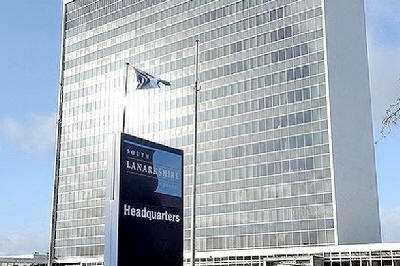|
The
Justice Bill reached Stage 1 in the Parliament Chamber on its journey to
becoming Scottish legislation. An area of contention for some people has
been over the issue of corroboration. For myself and my SNP colleagues,
the answer is so obvious we struggle to understand the objections to its
removal.
The
current system means that before you can bring a case in front of the
Procurator Fiscal for him to consider whether it should go to court, you
must have two objective and independent pieces of evidence.
The
trouble with that is if you happen to have been a woman who was raped or
you are a victim of domestic abuse, you don’t tend to have objective
witnesses to those crimes.
Of
course you must have good quality testament and as much evidence as you
can get. But should you be barred from your case even being considered
for trial for the absence of those two pieces of evidence?
Currently, there are 2,800 recorded cases of domestic abuse which took
place in the last two years, plus another 170 reported rapes that will
never be tried in court. Those women are denied recourse to the legal
system because of very old and out-dated criteria.

Scottish Justice Secretary, Kenny Macaskill MSP
The
burden of proof for rape in Scotland is extremely high – currently, not
only does the Crown have to prove and corroborate that sexual
intercourse took place and the complainer did not consent to it, they
also have to prove and corroborate that the accused knew the complainer
wasn’t consenting.
I
think removal of corroboration will help abused women to push for
justice, as is their right and, as a government, our responsibility to
help them do so. Continuing it will mean we are denying that fundamental
right to justice for an entire group of vulnerable people. There will be
no diminution of the evidence requirement, no risk of miscarriages of
justice and no question of the courts being suddenly overwhelmed with
new cases.
What
the removal of the corroboration requirement will do is open up the
doors to justice and that to me is a very good thing.
I
spoke on the subject in the Chamber last week.
Our
Cabinet Secretary for Justice, Kenny Macaskill, has gathered together a
vast amount of research and opinion on this whole subject. I find it
completely convincing.
You
can read the Bill here:
http://tinyurl.com/Justice-Bill
And you can watch the
full debate here – my contribution comes 58 minutes in - :
http://tinyurl.com/Justice-debate
And
here you can see the Rape Crisis Scotland’s briefing on corroboration
which explains in more detail how important it is for Scotland to remove
it, especially in cases involving violence against women:
http://tinyurl.com/rape-crisis-centre
South
Lanarkshire Council
Speaking of equality, I was pleased to finally hear that South
Lanarkshire Council (SLC) has admitted that it is guilty of having
underpaid women who were doing equivalent work to men. This case has
gone on far longer than necessary. The Council must have known that
their behaviour was unacceptable but they continued to fight the claim
and deny the women a resolution.
Of
course, because the obvious result has been made formal, SLC now has to
identify some £75 million to settle the claims against it and give the
3000 women affected due justice.

South Lanarkshire Council Headquarters in Hamilton
Yet
SLC remains determined not to tell its Council Tax payers just where
it’s going to find the money from. Having backed themselves into a
corner and been exposed, they Council says it has the money “in
reserve.”
Now,
you will all be very well aware that Councils throughout the UK are
being squeezed and squeezed by Westminster’s Chancellor George Osborne.
Savings at enormous levels are being demanded at every turn.
The
Council’s budget is £679 million for the coming year, according to
Council leader, Eddie McEvoy. Within that, he says, frontline services
will be protected despite the pressure on budgets.
So it
seems unlikely to me that they would have a useful tidy spare cash
bucket of £72 million available without compromising other services and
commitments. In my estimation, reading the Council’s own budget figures,
the truth is that the reserve is about £30 million.
But
they won’t talk about it. Instead, they meet in secrecy, behind closed
doors to take their private decisions. Both Eddie McAvoy and chief
executive Lindsay Freeland declined requests from the local newspaper,
the Hamilton Advertiser, to discuss the matter. You can see that story
here:
http://preview.tinyurl.com/o6ljwpt
We
shall have to wait and see what happens.
Professor Ailsa McKay: Tributes
I was
profoundly saddened to hear of the death of feminist economist, Ailsa
McKay. At only 50, she had been fighting cancer for a considerable time
- and I do mean fighting.

Professor Ailsa McKay, Feminist Economist
at Glasgow Caledonian University
Ailsa’s voice was crucial to the current SNP Government’s decision to
commit to hugely extended childcare in Scotland, so encouraging more
women to join or re-join the workforce.
The
First Minister spoke in the Chamber of her “astonishing contribution” in
the campaign for gender equality.
Ailsa
McKay was professor of economics at Glasgow Caledonian University and a
leading figure in pushing the case for women up the agenda.
This
tragically early passing of an inspiring woman grieves us all.
I put
forward a motion in Parliament commending her contribution as a board
member of the think tank, the Jimmy Reid Foundation and her passionate
campaign for Radical Independence in Scotland. See:
www.radicalindependence.org
Her
work will continue to impact on all of us in Scotland who care
profoundly about gender equality.
Marie Curie Daffodil Appeal
Cancer
cost Ailsa McKay her life and it will impact in one way or another on
most of us, if not for ourselves then someone close to us.
Recovery rates are much better than they used to be and various breast,
bowel and cervical screening programmes are pulling many people back
from the brink.
All
people who have cancer need help and support. No one should face it
alone.

At the Marie Curie Cancer
Care stand in the Scottish Parliament with patron, Jackie Callender
So I
was proud to lend my support to Marie Curie Cancer Care’s Great Daffodil
Appeal at the Scottish Parliament last week.
Marie
Curie helps care for terminally ill patients and their families across
Scotland and they need donations from the public to do so. The money
that the appeal raises will help the nurses that the charity employs to
provide more free care to local people with terminal illnesses in their
own homes and in the two Scottish Marie Curie Hospices in Edinburgh and
Glasgow.
The
Daffodil Appeal is the charity’s biggest fundraising campaign and
encourages everyone to give a donation and wear one of the charity’s
daffodil pins during March.
Since
the first appeal took place in 1986, more than £70 million has been
raised to fund the charity’s work.
You
can find out more about the Marie Curie Cancer Care appeal here:
www.mariecurie.org.uk/daffodil |

